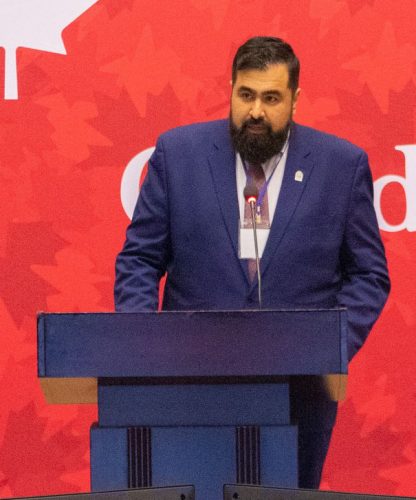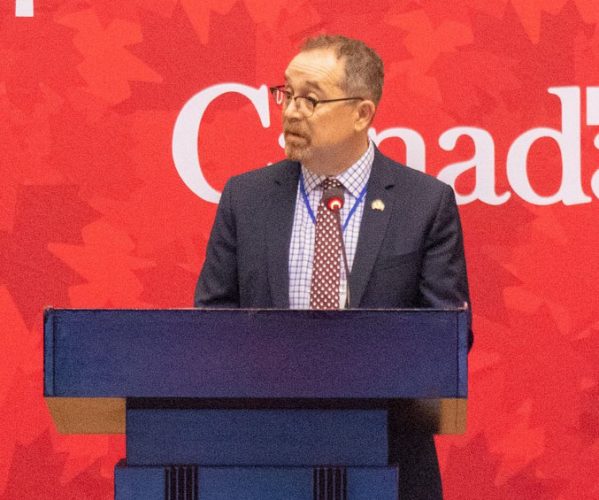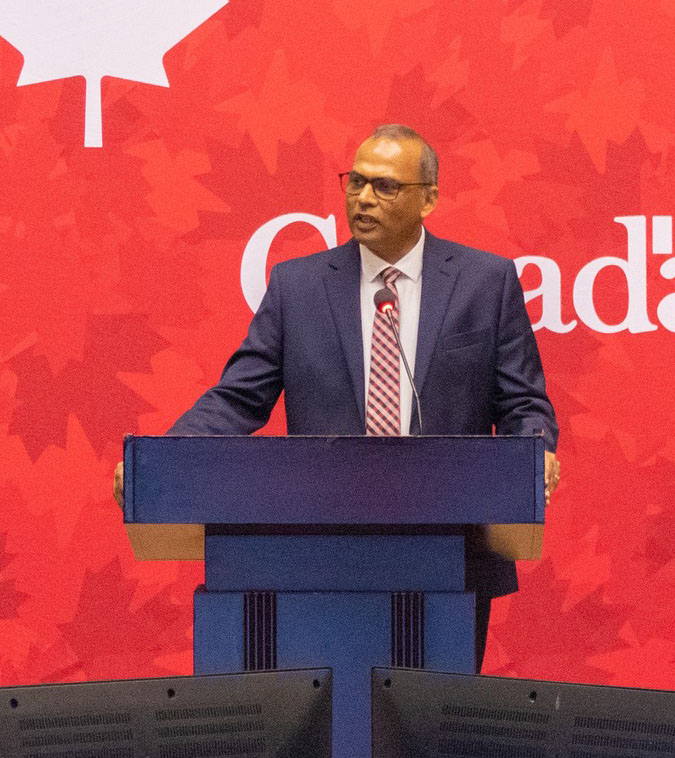The Canadian High Com-mission yesterday launch-ed a Cdn$2.9m ($456.5m) mental health project targeting over 67,000 vulnerable Guyanese over a five-year period.
The project “Safeguarding the Human Dignity and Rights of Populations at Risk for Ill-Mental Health in Vulnerable Communities across Guyana” was described as Canada’s first mental health project in the Caribbean region and will be funded by Global Affairs Canada and executed by Canadian partner, International Development and Relief Foundation (IDRF).
The Canadian High Commission said that IDRF is a non-profit Canadian-registered charity working with partners around the world and locally to facilitate relief and development programmes that target vulnerable populations, helping to alleviate immediate and long-term troubles. It noted that IDRF’s model for achieving community development is to partner with local experts, international NGOs, and grassroots organizations, and to leverage resources to ensure maximum impact.

Their projects are initiated by local partners who understand the challenges and opportunities of the particular context in which they live and work. IDRF has been undertaking humanitarian and charitable work here in Guyana for over a decade.
The project, expected to run over the next five years, seeks to enhance the dignity and rights of vulnerable Guyanese by strengthening the availability and capacity of mental health services at both the community and school levels to address, among other things, comparatively high suicide rates. It will include advocacy to increase understanding of mental health challenges and reduce stigma.
The project will partner with local NGOs to deliver a community-oriented care approach to mental health and well-being that builds on existing social structures and the strengths of community health workers, mental health survivors, multi-faith leaders and communities’ capacities to work together to chart a new path of mental health resilience.
Delivering a virtual address at the launching yesterday, Canada’s Minis-ter of International Development Harjit Sajjan said that the project will leverage IDRF’s deep knowledge and experience to help build a stronger and more sustainable mental health system in Guyana.
“I’m pleased to announce that Canada will contribute $2.9 million to help address mental health in vulnerable communities in Guyana in partnership with the International Development and Relief foundation. IDRF is a well-known and trusted community and their healthcare services have impacted more than 200,000 people worldwide.

“Today’s launch also marks Canada’s first mental health project in the Caribbean region and I’m heartened to see mental health care gaining more attention as part of our international development programme. Making mental health care more accessible is a priority for our government, in coordination with the government of Guyana,” Sajjan said.
In silence
He noted that too often, people struggle with mental health challenges in silence owing to the stigma associated with seeking help. The Canadian Minister said that the project is aimed at making sure that there is appropriate and effective mental health care available to support persons. He said that making mental health care more accessible will help people realize their full potential to make meaningful contributions to their families and communities.
“For mental health projects like this one to be effective, we recognize that local knowledge and experience are essential. Development programmes must be tailored to respond to local needs [and] that’s why IDRF worked directly with local NGOs to deliver a community-oriented approach to care that isn’t a one size fits all solution, but instead relies on the proven strengths of community health workers.
“They will also work in partnership with mental health survivors, faith leaders and community members in order to diversify the avenues of health and promote conversations about mental health in their communities. This project will also complement the extensive work of the government of Guyana, the Ministry of Health continues to work tirelessly to address mental health and foster resilience for citizens. This project builds on and supports those efforts,” he explained.
Meanwhile, Canadian High Commissioner to Guyana Mark Berman said that his country is committed to working with the Government of Guyana to help strengthen and improve the health sector and particularly the mental health sector in this instance. He noted that the global mental health landscape has shifted significantly over the last few years as governments and international organizations have started to prioritize mental health in both national and international agendas.
He said that the World Health Organization (WHO) estimates that globally one out of four people will be affected by mental or neurological disorders at some point in their lives. He added that mental illnesses are the leading cause of loss of economic output with an estimated cost of nearly US$2.5 trillion annually and that is expected to doubly by 2030.
“All age groups and communities are impacted, but particularly vulnerable groups including women who have experienced gender and sexually based violence. People in fragile and conflict-affected situations and adolescents, particularly adolescent girls aged between 15 and 19, among whom suicide is the leading cause of premature death worldwide.
“The magnitude of the mental health burden is not matched by the size and effectiveness of the res-ponse it demands. Though many disorders can be prevented or successfully treated, two-thirds of countries allocate 1% or less of their health budgets to mental health with the poor often bearing the greater burden in terms of risks and lack of access to treatment,” Berman said.
Resilience in schools
He said that Canada is pleased to support the project in Guyana noting that it will aid in strengthening the work of government by targeting mental health resilience in schools through the provision of counselling and community-based mental health care, as well as reintegration of patients with mental illness back into their communities.
He explained that the project is in alignment with the human dignity pillar of Canada’s feminist international assistance policy.
“…I’d like to again commend the government of Guyana for recently passing what has been described as a comprehensive and transformational Suicide Prevention Bill 2022 just last week in the National Assembly. The bill seeks to, among other things, comprehensively address suicide and mental health promotion, and care across a number of institutions through government collaboration and cooperation.
“I want to reiterate that our project with IDRF is intended to complement local efforts and was designed in anticipation of many provisions covered under the bill. I’m therefore confident that I also speak for our friends at IDRF when I say we are invigorated by the passage of the bill and stand ready to support the Ministry of Health and other agencies in Guyana as they forge a new path to mental health resilience,” Berman said.
Get off of the list
Guyana is currently ranked number two in the world for the highest suicide rate per capita and according to Minister of Health Dr Frank Anthony, the goal is to get off of the list.
“We, of course, have a big challenge in terms of mental health and this has been a problem that we’ve been working on for many years. We have seen the [suicide] numbers go down slightly but as Professor Hogan would have pointed out, we want to come off that [list]. We don’t want to be number two or number three, we just want to get off the list and for us to get off we need to make sure that we can educate the population. We need to make sure that we have systems that can detect when people are vulnerable. So we need to understand when people are going through depression to be able to detect that and once we are able to detect that, to come up with a plan of how we are going to treat and help those persons,” Anthony told the gathering.
In 2020, Guyana recorded 147 deaths by suicide
The Health Minister said that the government is working to bring the numbers down while also putting mechanisms in place to address mental health. He pointed to the Suicide Prevention Act which was recently assented to by President Irfaan Ali and said that government is working to develop a poison prevention centre. He said that the focus is on poison prevention since ingestion of herbicides and pesticides accounts for a majority of suicides in the country.
He noted that diagnosing mental illnesses at an early stage is also of paramount importance to the government.
“We also need really to strengthen the broader mental health effort in the country and one of the things that we have to do is to strengthen primary health care. A lot of our physicians and health care practitioners at the primary health care level, they have challenges sometimes detecting persons who are vulnerable, persons who might be displaying signs and symptoms of say depression or persons who have suicidal ideation. We don’t ask these questions when people come to our clinics and because of that, we sometimes don’t detect the challenges that people are going through,” he related.
He said that the project will aid the government in overhauling the system and possibly achieving its objectives.
During the five-year period, the project will target 67,750 adults and children by providing them with training, counselling and access to other forms of mental health assistance.
IDRF’s Chief Executive Officer Mahmood Quasim said that the organisation has been working in Guyana since 2005 and has supported over 40,000 persons with various forms of aid. He noted that the project has been in the pipeline for a number of years and its launching is a culmination of intense consultations and planning.
“These informative consultations have led to an impactful project design for which the contribution agreement came to place this year. Our goal through this project is not only to meet the objectives we agreed with Global Affairs Canada and the Government of Guyana but to ensure that these project outcomes have a lasting impact on the lives of the communities we support.
“To do this, we are committed to the following – ensure all local guidance project staff understand the context, the local and regional challenges and the areas of opportunity where this project can grow. Our work is implemented in partnership with local organizations that work in education and health care and are women and children oriented which connects directly with Canada’s feminist international assistance policy,” he explained.
He further stated that their work would be guided by the immediate needs of the government.






